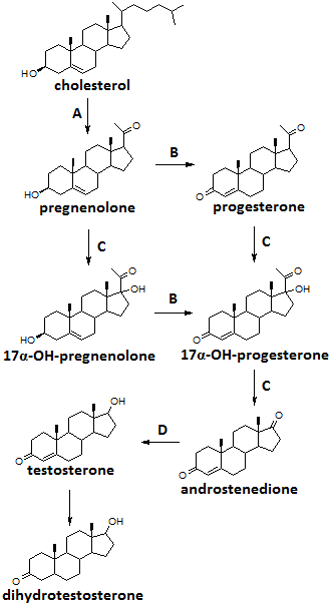P1031
Leydig cells are located in the testis of the human body. Their main function is to produce testosterone (T), an important hormone involved in the development of male sexual organs, movement of the testis into the scrotum and spermatogenesis. Although Leydig cells are only about 5% of the total cells in the body, they produce nearly 95% of the circulating T; the rest of the circulating T is secreted by the adrenal gland. In some tissues testosterone is cleaved into a more potent androgen, dihydrotestosterone (DHT) by 5α- reductases.
There are many substances that can affect the circulating T levels. The substances that affect the circulating T levels are known as Endocrine disruptors (EDs) and include plastizers (phathalate, bisphernol A), surfactants (perfluoroalkyl substances), pesticides (methoxychol) and plant constitutes (genistein and gossypol). The EDs discussed here antagonize the function of androgens in tissues. One of the tissues where EDs act are Leydig cells, where they act through several pathways including: suppressing androgen production and/or binding to the androgen receptors (ARs) to block their activation by androgens.
In fetal and adult Leydig cells there are at least four steroid-synthesizing enzymes involved in T biosynthesis. T synthesis starts with cholesterol. The first steroid enzyme is cholesterol side chain cleavage enzyme (CYP11A1), located in the inner mitochondria membrane.
The enzyme then catalyzes three additional reactions from cholesterol forming pregnenolone. Pregnenolone diffuses from the mitochondria into the smooth endoplasmic reticulum, where three steroid synthesizing enzymes are located, including 3β-hydrooxysteroid dehydrogenase, cytochrome P450 17α-hydroxylase and 17β-hydroxysteroid dehydrogenase 3.
 Figure 1. Biosynthetic pathway of testosterone.
Figure 1. Biosynthetic pathway of testosterone.
Enzyme A is CYP11A1, Enzyme B is 3β-hydrooxysteroid dehydrogenase, Enzyme C is cytochrome P450 17α-hydroxylase and Enzyme D is 17β-hydroxysteroid dehydrogenase 3.
Find an error? Take a screenshot, email it to us at error@mytestingsolution.com, and we’ll send you $3!
